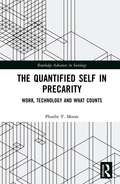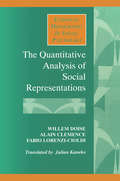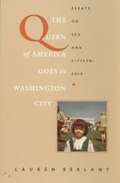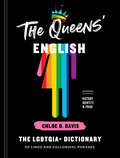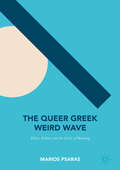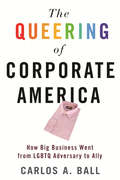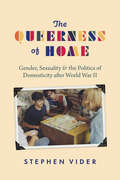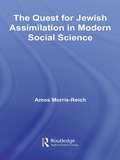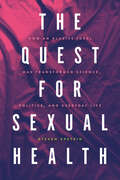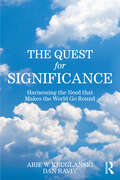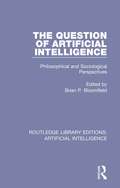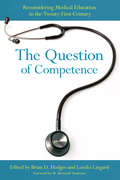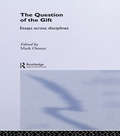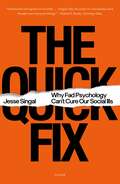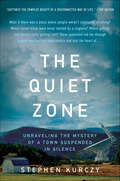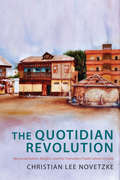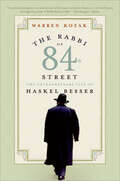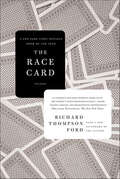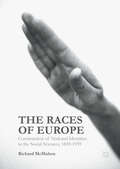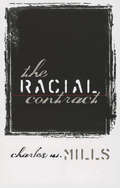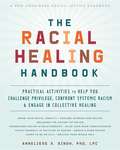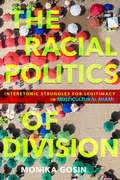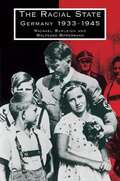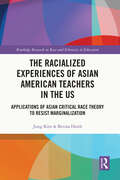- Table View
- List View
The Quantified Self in Precarity: Work, Technology and What Counts (Routledge Advances in Sociology)
by Phoebe V. MooreHumans are accustomed to being tool bearers, but what happens when machines become tool bearers, calculating human labour via the use of big data and people analytics by metrics? The Quantified Self in Precarity highlights how, whether it be in insecure ‘gig’ work or office work, such digitalisation is not an inevitable process – nor is it one that necessarily improves working conditions. Indeed, through unique research and empirical data, Moore demonstrates how workplace quantification leads to high turnover rates, workplace rationalisation and worker stress and anxiety, with these issues linked to increased rates of subjective and objective precarity. Scientific management asked us to be efficient. Now, we are asked to be agile. But what does this mean for the everyday lives we lead? With a fresh perspective on how technology and the use of technology for management and self-management changes the ‘quantified’, precarious workplace today, The Quantified Self in Precarity will appeal to undergraduate and postgraduate students interested in fields such as Science and Technology, Organisation Management, Sociology and Politics.
The Quantitative Analysis of Social Representations (European Monographs in Social Psychology)
by Fabio Lorenzi-Cioldi Alain Clemence Willem DoiseDesigned for undergraduate and postgraduate courses in sociology and social psychology, this textbook looks at the quantitative methodology of social representations research, using empirical and graphical illustrations and data tables.
The Queen of America Goes to Washington City: Essays on Sex and Citizenship
by Lauren BerlantIn The Queen of America Goes to Washington City, Lauren Berlant focuses on the need to revitalize public life and political agency in the United States. Delivering a devastating critique of contemporary discourses of American citizenship, she addresses the triumph of the idea of private life over that of public life borne in the right-wing agenda of the Reagan revolution. By beaming light onto the idealized images and narratives about sex and citizenship that now dominate the U.S. public sphere, Berlant argues that the political public sphere has become an intimate public sphere. She asks why the contemporary ideal of citizenship is measured by personal and private acts and values rather than civic acts, and the ideal citizen has become one who, paradoxically, cannot yet act as a citizen--epitomized by the American child and the American fetus.As Berlant traces the guiding images of U.S. citizenship through the process of privatization, she discusses the ideas of intimacy that have come to define national culture. From the fantasy of the American dream to the lessons of Forrest Gump, Lisa Simpson to Queer Nation, the reactionary culture of imperilled privilege to the testimony of Anita Hill, Berlant charts the landscape of American politics and culture. She examines the consequences of a shrinking and privatized concept of citizenship on increasing class, racial, sexual, and gender animosity and explores the contradictions of a conservative politics that maintains the sacredness of privacy, the virtue of the free market, and the immorality of state overregulation--except when it comes to issues of intimacy.Drawing on literature, the law, and popular media, The Queen of America Goes to Washington City is a stunning and major statement about the nation and its citizens in an age of mass mediation. As it opens a critical space for new theory of agency, its narratives and gallery of images will challenge readers to rethink what it means to be American and to seek salvation in its promise.
The Queens' English: The LGBTQIA+ Dictionary of Lingo and Colloquial Phrases
by Chloe O. DavisA landmark reference guide to the LGBTQIA+ community's contributions to the English language--an intersectional, inclusive, playfully illustrated glossary featuring more than 800 terms and fabulous phrases created by and for queer culture.Do you know where "yaaaas queen!" comes from? Do you know the difference between a bear and a wolf? Do you know what all the letters in LGBTQIA+ stand for?The Queens' English is a comprehensive guide to modern gay slang, queer theory terms, and playful colloquialisms that define and celebrate LGBTQIA+ culture. This modern dictionary provides an in-depth look at queer language, from terms influenced by celebrated lesbian poet Sappho and from New York's underground queer ball culture in the 1980s to today's celebration of RuPaul's Drag Race.The glossary of terms is supported by full-color illustrations and photography throughout, as well as real-life usage examples for those who don't quite know how to use "kiki," "polysexual," or "transmasculine" in a sentence. A series of educational lessons highlight key people and events that shaped queer language; readers will learn the linguistic importance of pronouns, gender identity, Stonewall, the Harlem Renaissance, and more.For every queen in your life--the men, women, gender non-conforming femmes, butches, daddies, and zaddies--The Queens' English is at once an education and a celebration of queer history, identity, and the limitless imagination of the LGBTQIA+ community.
The Queer Greek Weird Wave
by Marios PsarasCinema might not be able to help heal a broken nation but it can definitely help revisit a nation's past, reframe its present and re-imagine its future. This is the first book-length study on what has become an internationally acclaimed strand in contemporary Greek cinema. Psaras examines how this particular trend can be thought of as an integral aesthetic response to the infamous Greek crisis, illuminating its fundamental ideological aspects by means of a queer critique of national politics. Drawing on a wide range of methodological approaches from queer theory, film theory, ethical philosophy and psychoanalysis, this volume sheds light on the way the Greek Weird Wave challenges, deconstructs and re-imagines traditional notions of Greekness, the Greek nation and the Greek patriarchal family. This is achieved through close textual analysis of the subversive thematics and idiosyncratic forms of six films made by some of the best-known and most celebrated contemporary Greek directors including Dogtooth (2009) and Alps (2011) by Yorgos Lanthimos, Strella (2009) by Panos H. Koutras, and Attenberg (2010) by Athina-Rachel Tsangaris.
The Queering of Corporate America: How Big Business Went from LGBTQ Adversary to Ally
by Carlos A. BallAn accurate picture of the LGBTQ rights movement's achievements is incomplete without this surprising history of how corporate America joined the cause.Legal scholar Carlos Ball tells the overlooked story of how LGBTQ activism aimed at corporations since the Stonewall riots helped turn them from enterprises either indifferent to or openly hostile toward sexual minorities and transgender individuals into reliable and powerful allies of the movement for queer equality. As a result of street protests and boycotts during the 1970s, AIDS activism directed at pharmaceutical companies in the 1980s, and the push for corporate nondiscrimination policies and domestic partnership benefits in the 1990s, LGBTQ activism changed big business's understanding and treatment of the queer community. By the 2000s, corporations were frequently and vigorously promoting LGBTQ equality, both within their walls and in the public sphere. Large companies such as American Airlines, Apple, Google, Marriott, and Walmart have been crucial allies in promoting marriage equality and opposing anti-LGBTQ regulations such as transgender bathroom laws. At a time when the LGBTQ movement is facing considerable political backlash, The Queering of Corporate America complicates the narrative of corporate conservatism and provides insights into the future legal, political, and cultural implications of this unexpected relationship.
The Queerness of Home: Gender, Sexuality, and the Politics of Domesticity after World War II
by Stephen ViderVider uncovers how LGBTQ people reshaped domestic life in the postwar United States. From the Stonewall riots to the protests of ACT UP, histories of queer and trans politics have almost exclusively centered on public activism. In The Queerness of Home, Stephen Vider turns the focus inward, showing that the intimacy of domestic space has been equally crucial to the history of postwar LGBTQ life. Beginning in the 1940s, LGBTQ activists looked increasingly to the home as a site of connection, care, and cultural inclusion. They struggled against the conventions of marriage, challenged the gendered codes of everyday labor, reimagined domestic architecture, and contested the racial and class boundaries of kinship and belonging. Retelling LGBTQ history from the inside out, Vider reveals the surprising ways that the home became, and remains, a charged space in battles for social and economic justice, making it clear that LGBTQ people not only realized new forms of community and culture for themselves—they remade the possibilities of home life for everyone.
The Quest for Jewish Assimilation in Modern Social Science (Routledge Studies in Social and Political Thought #Vol. 54)
by Amos Morris-ReichThe transformation of the human sciences into the social sciences in the third part of the 19th century was closely related to attempts to develop and implement methods for dealing with social tensions and the rationalization of society. This book studies the connections between academic disciplines and notions of Jewish assimilation and integration and demonstrates that the quest for Jewish assimilation is linked to and built into the conceptual foundations of modern social science disciplines. Focusing on two influential "assimilated" Jewish authors—anthropologist Franz Boas and sociologist Georg Simmel—this study shows that epistemological considerations underlie the authors’ respective evaluations of the Jews’ assimilation in German and American societies as a form of "group extinction" or as a form of "social identity." This conceptual model gives a new "key" to understanding pivotal issues in recent Jewish history and in the history of the social sciences.
The Quest for Sexual Health: How an Elusive Ideal Has Transformed Science, Politics, and Everyday Life
by Steven EpsteinOffering an entryway into the distinctive worlds of sexual health and a window onto their spillover effects, sociologist Steven Epstein traces the development of the concept and parses the debates that swirl around it. Since the 1970s, health professionals, researchers, governments, advocacy groups, and commercial interests have invested in the pursuit of something called "sexual health." Under this expansive banner, a wide array of programs have been launched, organizations founded, initiatives funded, products sold—and yet, no book before this one asks: What does it mean to be sexually healthy? When did people conceive of a form of health called sexual health? And how did it become the gateway to addressing a host of social harms and the reimagining of private desires and public dreams? Conjoining "sexual" with "health" changes both terms: it alters how we conceive of sexuality and transforms what it means to be healthy, prompting new expectations of what medicine can provide. Yet the ideal of achieving sexual health remains elusive and open-ended, and the benefits and costs of promoting it are unevenly distributed across genders, races, and sexual identities. Rather than a thing apart, sexual health is intertwined with nearly every conceivable topical debate—from sexual dysfunction to sexual violence, from reproductive freedom to the practicalities of sexual contact in a pandemic. In this book Steven Epstein analyzes the rise, proliferation, uptake, and sprawling consequences of sexual health activities, offering critical tools to assess those consequences, expand capacities for collective decision making, and identify pathways that promote social justice.
The Quest for Significance: Harnessing the Need that Makes the World Go Round
by Arie W. Kruglanski Dan RavivThe Quest for Significance: Harnessing the Need that Makes the World Go Round is a fascinating exploration of why we all seek Significance – a fundamental human motivation – and how we can understand it to help us lead better lives.Renowned psychologist Arie Kruglanski and journalist Dan Raviv show how the Quest for Significance propels our actions, governs our feelings, and dominates our thoughts: pervasively affecting our happiness, pursuits, and relationships. Drawing on both academic research and the personal experiences of the authors, including Kruglanski’s childhood in Poland during the Holocaust, the authors help readers to understand themselves and people around them – to promote happiness, gain friendship, and find love.This one-of-a-kind book is fascinating reading for students, professionals, and anyone interested in how they can better appreciate themselves and those close to them, and live a fulfilling life.
The Question of Access
by Tanya TitchkoskyValues such as 'access' and 'inclusion' are unquestioned in the contemporary educational landscape. But many methods of addressing these issues -- installing signs, ramps, and accessible washrooms -- frame disability only as a problem to be 'fixed.' The Question of Access investigates the social meanings of access in contemporary university life from the perspective of Cultural Disability Studies.Through narratives of struggle and analyses of policy and everyday practices, Tanya Titchkosky shows how interpretations of access reproduce conceptions of who belongs, where and when. Titchkosky examines how the bureaucratization of access issues has affected understandings of our lives together in social space. Representing 'access' as a beginning point for how disability can be rethought, rather than as a mere synonym for justice, The Question of Access allows readers to critically question their own implicit conceptions of disability, non-disability, and access.
The Question of Artificial Intelligence: Philosophical and Sociological Perspectives (Routledge Library Editions: Artificial Intelligence #2)
by Brian P. BloomfieldOriginally published in 1987 when Artificial Intelligence (AI) was one of the most hotly debated subjects of the moment; there was widespread feeling that it was a field whose ‘time had come’, that intelligent machines lay ‘just around the corner’. Moreover, with the onset of the revolution in information technology and the proclamation from all corners that we were moving into an ‘information society’, developments in AI and advanced computing were seen in many countries as having both strategic and economic importance. Yet, aside from the glare of publicity that tends to surround new scientific ideas or technologies, it must be remembered that AI was a relative newcomer among the sciences; that it had often been the subject of bitter controversy; and that though it had been promising to create intelligent machines for some 40 years prior to publication, many believe that it had actually displayed very little substantive progress. With this background in mind, the aim of this collection of essays was to take a novel look at AI. Rather than following the path of old well-trodden arguments about definitions of intelligence or the status of computer chess programs, the objective was to bring new perspectives to the subject in order to present it in a different light. Indeed, instead of simply adding to the endless wrangling ‘for’ and ‘against’ AI, the source of such divisions is made a topic for analysis in its own right. Drawing on ideas from the philosophy and sociology of scientific knowledge, this collection therefore broke new ground. Moreover, although a great deal had been written about the social and cultural impact of AI, little had been said of the culture of AI scientists themselves – including their discourse and style of thought, as well as the choices, judgements, negotiations and competitive struggles for resources that had shaped the genesis and development of the paradigmatic structure of their discipline at the time. Yet, sociologists of science have demonstrated that the analysis of factors such as these is a necessary part of understanding the development of scientific knowledge. Hence, it was hoped that this collection would help to redress the imbalance and provide a broader and more interesting picture of AI.
The Question of Competence: Reconsidering Medical Education in the Twenty-First Century
by M. Brownell Anderson Brian D. Hodges Lorelei LingardMedical competence is a hot topic surrounded by much controversy about how to define competency, how to teach it, and how to measure it. While some debate the pros and cons of competence-based medical education and others explain how to achieve various competencies, the authors of the seven chapters in The Question of Competence offer something very different. They critique the very notion of competence itself and attend to how it has shaped what we pay attention to-and what we ignore-in the education and assessment of medical trainees.Two leading figures in the field of medical education, Brian D. Hodges and Lorelei Lingard, draw together colleagues from the United States, Canada, and the Netherlands to explore competency from different perspectives, in order to spark thoughtful discussion and debate on the subject. The critical analyses included in the book's chapters cover the role of emotion, the implications of teamwork, interprofessional frameworks, the construction of expertise, new directions for assessment, models of self-regulation, and the concept of mindful practice. The authors juxtapose the idea of competence with other highly valued ideas in medical education such as emotion, cognition and teamwork, drawing new insights about their intersections and implications for one another.
The Question of the Gift: Essays Across Disciplines (Routledge Studies in Anthropology)
by Mark OsteenThe Question of the Gift is the first collection of new interdisciplinary essays on the gift. Bringing together scholars from a variety of fields, including anthropology, literary criticism, economics, philosophy and classics, it provides new paradigms and poses new questions concerning the theory and practice of gift exchange. In addressing these questions, contributors not only challenge the conventions of their fields, but also combine ideas and methods from both the social sciences and humanities to forge innovative ways of confronting this universal phenomenon.
The Quick Fix: Why Fad Psychology Can't Cure Our Social Ills
by Jesse SingalAn investigative journalist exposes the many holes in today’s bestselling behavioral science, and argues that the trendy, TED-Talk-friendly psychological interventions that are so in vogue at the moment will never be enough to truly address social injustice and inequality.With their viral TED talks, bestselling books, and counter-intuitive remedies for complicated problems, psychologists and other social scientists have become the reigning thinkers of our time. Grit and “power posing” promised to help overcome entrenched inequalities in schools and the workplace; the Army spent hundreds of millions of dollars on a positive psychology intervention geared at preventing PTSD in its combat soldiers; and the implicit association test swept the nation on the strength of the claim that it can reveal unconscious biases and reduce racism in police departments and human resources departments. But what if much of the science underlying these blockbuster ideas is dubious or fallacious? What if Americans’ longstanding preference for simplistic self-help platitudes is exerting a pernicious influence on the way behavioral science is communicated and even funded, leading respected academics and the media astray? In The Quick Fix, Jesse Singal examines the most influential ideas of recent decades and the shaky science that supports them. He begins with the California legislator who introduced self-esteem into classrooms around the country in the 1980s and the Princeton political scientist who warned of an epidemic of youthful “superpredators” in the 1990s. In both cases, a much-touted idea had little basis in reality, but had a massive impact. Turning toward the explosive popularity of 21st-century social psychology, Singal examines the misleading appeal of entertaining lab results and critiques the idea that subtle unconscious cues shape our behavior. As he shows, today’s popular behavioral science emphasizes repairing, improving, and optimizing individuals rather than truly understanding and confronting the larger structural forces that drive social ills. Like Anand Giridharadas’s Winners Take All, The Quick Fix is a fresh and powerful indictment of the thought leaders and influencers who cut corners as they sell the public half-baked solutions to problems that deserve more serious treatment.
The Quiet Zone: Unraveling the Mystery of a Town Suspended in Silence
by Stephen KurczyIn this riveting account of an area of Appalachia known as the Quiet Zone where cell phones and WiFi are banned, journalist Stephen Kurczy explores the pervasive role of technology in our lives and the innate human need for quiet.“Captures the complex beauty of a disconnected way of life.” —The NationWith a new afterword to the paperback editionDeep in the Appalachian Mountains lies the last truly quiet town in America. Green Bank, West Virginia, is a place at once futuristic and old-fashioned: It’s home to the Green Bank Observatory, where astronomers search the depths of the universe using the latest technology, while schoolchildren go without WiFi or iPads. With a ban on all devices emanating radio frequencies that might interfere with the observatory’s telescopes, Quiet Zone residents live a life free from constant digital connectivity. But a community that on the surface seems idyllic is a place of contradictions, where the provincial meets the seemingly supernatural and quiet can serve as a cover for something darker.Stephen Kurczy embedded in Green Bank, making the residents of this small Appalachian village his neighbors. He shopped at the town’s general store, attended church services, went target shooting with a seven-year-old, square-danced with the locals, sampled the local moonshine. In The Quiet Zone, he introduces us to an unforgettable cast of characters. There is a tech buster patrolling the area for illegal radio waves; “electrosensitives” who claim that WiFi is deadly; a sheriff’s department with a string of unsolved murder cases dating back decades; a camp of neo-Nazis plotting their resurgence from a nearby mountain hollow. Amongst them all are the ordinary citizens seeking a simpler way of living. Kurczy asks: Is a less connected life desirable? Is it even possible?The Quiet Zone is a remarkable work of investigative journalism—at once a stirring ode to place, a tautly wound tale of mystery, and a clarion call to reexamine the role technology plays in our lives.
The Quotidian Revolution: Vernacularization, Religion, and the Premodern Public Sphere in India
by Christian Lee NovetzkeIn thirteenth-century Maharashtra, a new vernacular literature emerged to challenge the hegemony of Sanskrit, a language largely restricted to men of high caste. In a vivid and accessible idiom, this new Marathi literature inaugurated a public debate over the ethics of social difference grounded in the idiom of everyday life. The arguments of vernacular intellectuals pushed the question of social inclusion into ever-wider social realms, spearheading the development of a nascent premodern public sphere that valorized the quotidian world in sociopolitical terms.The Quotidian Revolution examines this pivotal moment of vernacularization in Indian literature, religion, and public life by investigating courtly donative Marathi inscriptions alongside the first extant texts of Marathi literature: the Lilacaritra (1278) and the Jñanesvari (1290). Novetzke revisits the influence of Chakradhar (c. 1194), the founder of the Mahanubhav religion, and Jnandev (c. 1271), who became a major figure of the Varkari religion, to observe how these avant-garde and worldly elites pursued a radical intervention into the social questions and ethics of the age. Drawing on political anthropology and contemporary theories of social justice, religion, and the public sphere, The Quotidian Revolution explores the specific circumstances of this new discourse oriented around everyday life and its lasting legacy: widening the space of public debate in a way that presages key aspects of Indian modernity and democracy.
The Rabbi of 84th Street: The Extraordinary Life of Haskel Besser
by Warren KozakAlways wearing an easy smile, Hasidic rabbi Haskel Besser spreads joy wherever he goes, enriching the lives of his many friends and congregants with his profound understanding of both Orthodox Judaism and humannature.With warmth and admiration, journalist Warren Kozak writes about the rabbi's extraordinary life—from his family's escape to Palestine in the late 1930s to his witnessing of Israel's rebirth in 1948, to his move to New York City, where he lives today.A rare window into the normally closed world of Hasidic Jews, The Rabbi of 84th Street is also the story of Judaism in the twentieth century; of the importance of centuries-old traditions; and of the triumph of faith, kindness, and spirit.
The Race Card: How Bluffing About Bias Makes Race Relations Worse
by Richard Thompson FordA New York Times Notable Book of the YearWhat do hurricane Katrina victims, millionaire rappers buying vintage champagne, and Ivy League professors waiting for taxis have in common? All have claimed to be victims of racism. But these days almost no one openly defends bigoted motives, so either a lot of people are lying about their true beliefs, or a lot of people are jumping to unwarranted conclusions--or just playing the race card. Daring, entertaining, and incisive, The Race Card brings sophisticated legal analysis, eye-popping anecdotes, and plain old common sense to this heated topic.
The Races of Europe
by Richard McmahonThis book explores a vital but neglected chapter in the histories of nationalism, racism and science. It is the first comprehensive study of the transnational scientific community that in the nineteenth and early twentieth centuries attempted to classify Europe's biological races. Anthropological race classifiers produced parallel geographies, histories and hierarchies of European peoples that were crucial to the creation of national identities and to the overtly political race discourses of eugenics and popular racist ideologues. They lent nationalism the invaluable prestige of natural science, and traced the histories, conflicts and relationships of 'national races' back into prehistory. Racial national character stereotypes meanwhile supported competing political ideologies. The book examines the interplay between class, gender and national identity narratives and the tensions and interactions between the scientific and political agendas of classifiers. Within the elaborate transnational networks of scientific communities, for example, they had to reconcile competing national narratives.
The Racial Contract
by Charles W. MillsThe Racial Contract puts classic Western social contract theory, deadpan, to extraordinary radical use. With a sweeping look at the European expansionism and racism of the last five hundred years, Charles W. Mills demonstrates how this peculiar and unacknowledged "contract" has shaped a system of global European domination: how it brings into existence "whites" and "non-whites," full persons and sub-persons, how it influences white moral theory and moral psychology; and how this system is imposed on non-whites through ideological conditioning and violence. The Racial Contract argues that the society we live in is a continuing white supremacist state. Holding up a mirror to mainstream philosophy, this provocative book explains the evolving outline of the racial contract from the time of the New World conquest and subsequent colonialism to the written slavery contract, to the "separate but equal" system of segregation in the twentieth-century United States. According to Mills, the contract has provided the theoretical architecture justifying an entire history of European atrocity against non-whites, from David Hume's and Immanuel Kant's claims that blacks had inferior cognitive power, to the Holocaust, to the kind of imperialism in Asia that was demonstrated by the Vietnam War. Mills suggests that the ghettoization of philosophical work on race is no accident. This work challenges the assumption that mainstream theory is itself raceless. Just as feminist theory has revealed orthodox political philosophy's invisible white male bias, Mills's explication of the racial contract exposes its racial underpinnings.
The Racial Healing Handbook: Practical Activities To Help You Challenge Privilege, Confront Systemic Racism, And Engage In Collective Healing (Social Justice Handbook)
by Anneliese A. SinghThe Racial Healing Handbook offers practical tools to help navigate daily and past experiences of racism, challenge internalized negative messages and privileges and handle feelings of stress and shame. It also helps learn to develop a profound racial consciousness and conscientiousness and heal from grief and trauma. Most importantly, it helps discover the building blocks to creating a community of healing in a world still filled with racial microaggressions and discrimination. This book is not just about ending racial harm--it is about racial liberation. It promises the possibility of moving through this pain and grief to experience the hope, resilience and freedom that helps not only self-actualize, but also makes the world a better place.
The Racial Politics of Division: Interethnic Struggles for Legitimacy in Multicultural Miami
by Monika GosinThe Racial Politics of Division deconstructs antagonistic discourses that circulated in local Miami media between African Americans, "white" Cubans, and "black" Cubans during the 1980 Mariel Boatlift and the 1994 Balsero Crisis. Monika Gosin challenges exclusionary arguments pitting these groups against one another and depicts instead the nuanced ways in which identities have been constructed, negotiated, rejected, and reclaimed in the context of Miami's historical multiethnic tensions. Focusing on ideas of "legitimacy," Gosin argues that dominant race-making ideologies of the white establishment regarding "worthy citizenship" and national belonging shape inter-minority conflict as groups negotiate their precarious positioning within the nation. Rejecting oversimplified and divisive racial politics, The Racial Politics of Division portrays the lived experiences of African Americans, white Cubans, and Afro-Cubans as disrupters in the binary frames of worth-citizenship narratives. Foregrounding the oft-neglected voices of Afro-Cubans, Gosin posits new narratives regarding racial positioning and notions of solidarity in Miami. By looking back to interethnic conflict that foreshadowed current demographic and social trends, she provides us with lessons for current debates surrounding immigration, interethnic relations, and national belonging. Gosin also shows us that despite these new demographic realities, white racial power continues to reproduce itself by requiring complicity of racialized groups in exchange for a tenuous claim on US citizenship.
The Racial State: Germany 1933-1945
by Michael Burleigh Wolfgang WippermannBetween 1933 and 1945 the Nazi regime in Germany tried to restructure a "class" society along racial lines. This book deals with the ideas and institutions that underpinned this mission, and shows how Nazi policy affected various groups of people, both victims and beneficiaries. The book begins with a serious discussion of the origins of Nazi racial ideology, and then demonstrates the way in which this was translated into official policy. It deals with the systematic persecution not only of the Jews, but also with the fate of lesser-known groups such as Sinti and Roma, the mentally handicapped, the "asocial," and homosexuals.
The Racialized Experiences of Asian American Teachers in the US: Applications of Asian Critical Race Theory to Resist Marginalization (Routledge Research in Race and Ethnicity in Education)
by Jung Kim Betina HsiehDrawing on in-depth interviews, this text examines how Asian American teachers in the US have adapted, persisted, and resisted racial stereotyping and systematic marginalization throughout their educational and professional pathways. Utilizing critical perspectives combined with tenets of Asian Critical Race Theory, Kim and Hsieh structure their findings through chapters focused on issues relating to anti-essentialism, intersectionality, and the broader social and historical positioning of Asians in the US. Applying a critical theoretical lens to the study of Asian American teachers demonstrates the importance of this framework in understanding educators’ experiences during schooling, training, and teaching, and in doing so, the book highlights the need to ensure visibility for a community so often overlooked as a "model minority", and yet one of the fastest growing racial groups in the US. This text will benefit researchers, academics, and educators with an interest in the sociology of education, multicultural education, and teachers and teacher education more broadly. Those specifically interested in Asian American history and the study of race and ethics within Asian studies will also benefit from this book.
